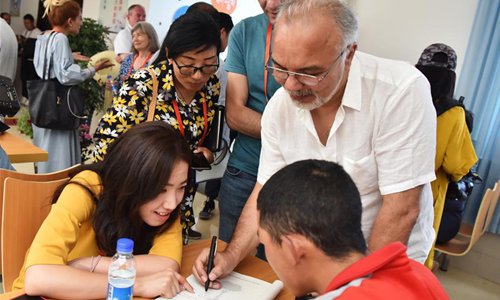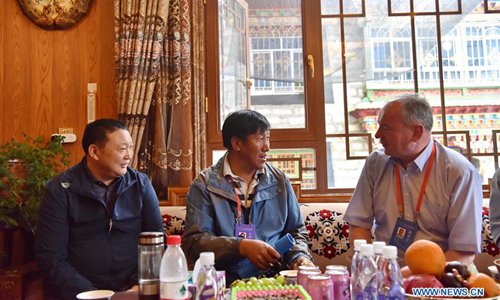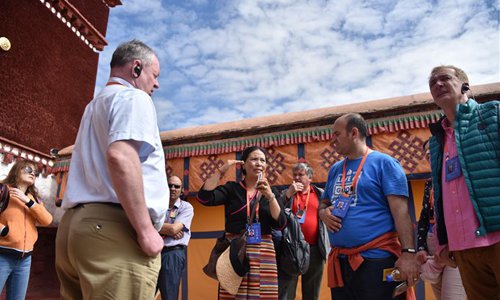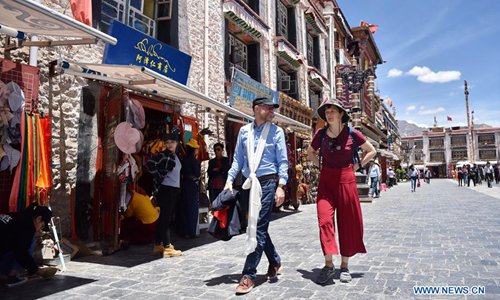Tibet hosts forum to pool wisdom for development, opening-up

Forum guests visit a high school in Lhasa, capital city of southwest China's Tibet Autonomous Region, June 13, 2019. The Forum on the Development of Tibet, China is held on Friday in the regional capital Lhasa. Nearly 160 scholars, officials, and correspondents from over 37 countries and regions are scheduled to attend the forum, hosted by the State Council Information Office and the Tibetan regional government. (Xinhua/Zhou Jinshuai)

A forum guest visits a village in Nyingchi of southwest China's Tibet Autonomous Region, June 11, 2019. The Forum on the Development of Tibet, China will be held on Friday in the regional capital Lhasa. Nearly 160 scholars, officials, and correspondents from over 37 countries and regions are scheduled to attend the forum, hosted by the State Council Information Office and the Tibetan regional government. (Xinhua/Zhou Jinshuai)
The 2019 Forum on the Development of Tibet opened on Friday in Lhasa, capital of Tibet Autonomous Region in southwest China.
The one-day forum, hosted by the State Council Information Office and the people's government of Tibet Autonomous Region, gathers nearly 160 scholars and officials from 37 countries and regions.
Focusing on the Belt and Road Initiative and Tibet's opening-up and development, attendees discussed topics such as the role of Tibet in the building of the Belt and Road, the opening-up of Tibet and the inheritance and development of Tibetan culture.
"The forum is to pool the wisdom of experts and scholars from all over the world, to jointly push forward the steady progress on the Belt and Road cooperation and promote Tibet's better integration into the building of the Belt and Road for its development, progress and modernization," said Ding Yexian, a senior Party official of Tibet, at the opening ceremony.
As an important participant of the ancient southern Silk Road route, Tibet has unique geographical advantages to join the building of the Belt and Road. The region is also an important land passage for China's opening-up toward South Asia. The region will seize the opportunities to further improve the opening-up policy, keep expanding the scope of opening-up, further promote foreign economic and trade cooperation and deepen people-to-people and cultural exchange, said Losang Jamcan, director of the Standing Committee of the Tibet Autonomous Regional People's Congress.
"We warmly welcome people from all over the world to visit Tibet for tourism, exchange and cooperation, experience the mystery of Tibet and its beauty and achieve win-win results," he said.
Prior to the forum, the delegates visited villages, elementary schools and maker-spaces in Nyingchi of southeast Tibet and held talks with people from various walks of life.
In the regional capital Lhasa, they visited a welfare facility, a hospital specialized in Tibetan medicine and a high school. They visited the Potala Palace, Jokhang Temple and Barkhor Street to learn first-hand about the protection of cultural relics and traditional culture in Tibet.
The delegates also visited a memorial hall that marks the emancipation of serfs. This year, Tibet celebrates the 60th anniversary of democratic reform that abolished serfdom.

Forum guests visit Potala Palace in Lhasa, capital city of southwest China's Tibet Autonomous Region, June 13, 2019. The Forum on the Development of Tibet, China will be held on Friday in the regional capital Lhasa. Nearly 160 scholars, officials, and correspondents from over 37 countries and regions are scheduled to attend the forum, hosted by the State Council Information Office and the Tibetan regional government. (Xinhua/Zhou Jinshuai)

Forum guests visit Barkhor Street in Lhasa, capital city of southwest China's Tibet Autonomous Region, June 13, 2019. The Forum on the Development of Tibet, China will be held on Friday in the regional capital Lhasa. Nearly 160 scholars, officials, and correspondents from over 37 countries and regions are scheduled to attend the forum, hosted by the State Council Information Office and the Tibetan regional government. (Xinhua/Zhou Jinshuai)